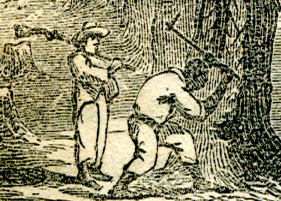
There are plenty of fine quotes about North Carolina and its people, but many of the older, negative statements about our state tend to have an impressive staying power, too. In an earlier post I mentioned William Byrd’s amusingly derogatory comment about the pork-eating prowess of North Carolinians. More than a century later, Frederick Law Olmsted weighed in with his judgment of the state.
Before he gained renown as perhaps the best-known landscape designer in American history, responsible for designing, among many other spaces, New York City’s Central Park and the grounds of the Biltmore Estate, Olmsted first came to the public eye through a series of articles about his travels in the antebellum South. Collected and published in 1856 as A Journey in the Seaboard Slave States, Olmsted’s conversational account of life in the South from Virginia to Louisiana is still an interesting and informative read. The image shown here is a detail from a scene from the book showing the production of turpentine, as well as a rather strict form of supervision.
Writing about the character of antebellum Tar Heels, Olmsted writes, “North Carolina has a proverbial reputation for the ignorance and torpidity of her people; being, in this respect, at the head of the Slave States.” This statement was at least qualified by placing the blame on the environment: “I do not find the reason of this in any innate quality of the popular mind; but, rather, in the circumstances under which it finds its development.” Olmsted blames poor soil and inadequate transportation, then takes an especially harsh view of the state’s schools:
The teachers are, generally, totally unfitted for their business; young men, as a clergyman informed me, themselves not only unadvanced beyond the lowest knowledge of the elements of primary school learning, but often coarse, vulgar, and profane in their language and behavior, who take up teaching as a temporary business, to supply the demand of a neighborhood of people as ignorant and uncultivated as themselves.
Those aren’t the kind of comments likely to be taken up by the Chamber of Commerce. Unfortunately, state histories tend to confirm this view of North Carolina during this period. It would be decades before necessary reforms to the state’s schools and infrastructure would improve the lives of many North Carolinians.
